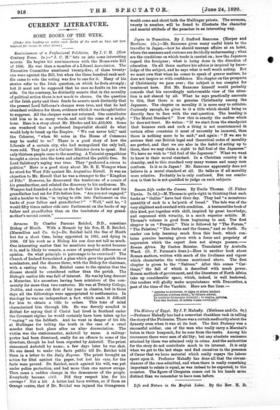Japan in Transition. By J. Stafford Ransome. (Harper and Brothers.
16s.)—Mr. Ransoms gives many useful hints to the traveller in Japan,—how he should manage affairs at an hotel, where the manners and customs are decidedly embarrassing ; what are the conditions on which trade is carried on ; how the Japanese regard the foreigner; what is being done in the direction of education. On all these matters his advice is inspired by know- ledge of the subject, and he says what is well worth noting. But we must own that when he comes to speak of graver matters, he does not inspire us with confidence. His chapter on the prospects of Christianity we pass over ; the subject is too complex for treatment here. But Mr. Ransome himself would probably concede that his exceedingly unfavourable view of the situa- tion is not shared by all. What he says practically amounts to this, that there is no genuine Christianity among the Japanese. The chapter on morality it is more easy to criticise. Curiously enough, he gives to it a title which should bring us directly face to face with the real question. The heading is " The Moral Standard." Now this is exactly the matter which be does not treat. He writes : " If we start from the standpoint that because such and such a thing is not countenanced in certain other countries it must of necessity be immoral, then there is nothing more to be said ;" and again : " If we are to assume that our British legal and theoretical codes of morality are perfect, and that we are also in the habit of acting up to them, then we may claim a right to fall foul of the Japanese." We have no wish to "fall foul of the Japanese." What we want to know is their moral standard. In a Christian country it is chastity, and to this standard very many women and many men conform. Is it so in Japan ? Mr. Ransome apparently does not believe in a moral standard at all. He talks as if all morality were relative. Probably he is only confused. But our conclu- sion is that he is not qualified to judge on such subjects.


















































 Previous page
Previous page